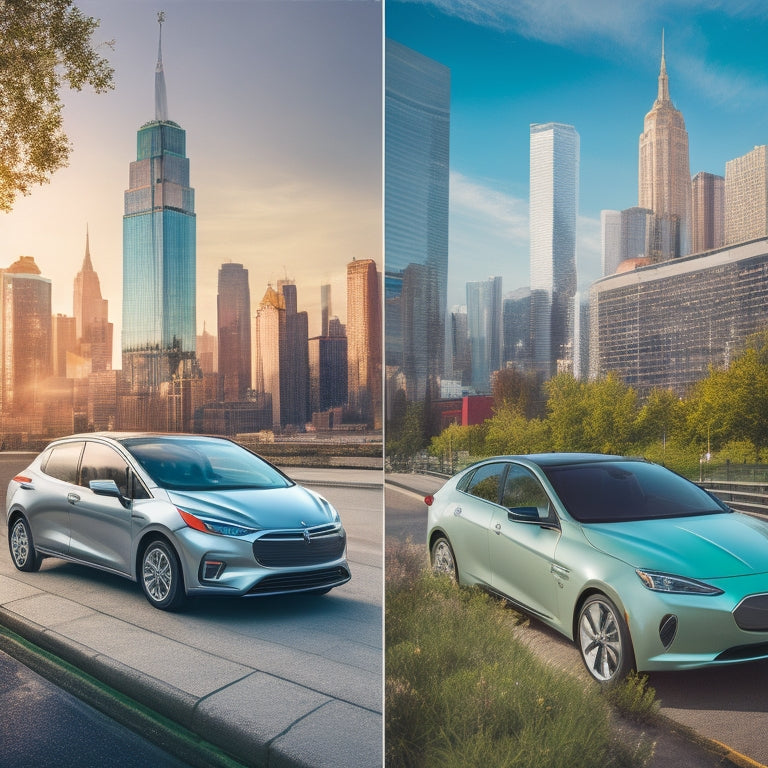
Electric Vs Gas Cars: Which Saves More
Share
You'll likely pocket $3 to $5 more per 100 miles driven by choosing an electric vehicle over a gas-powered one, thanks to electric vehicles' superior fuel efficiency. This translates to lower fuel costs per mile, with the equivalent of filling up at $3 per gallon. With an EV, you'll picture yourself saving with each mile driven. However, you'll want to weigh these savings against the higher upfront costs of EVs and consider post-warranty repair costs. As you dig deeper into the numbers, you'll uncover more insights that'll help you make an informed decision on which ride saves you more in the long run.
Key Takeaways
• Electric vehicles offer lower cost per mile due to superior fuel efficiency, equivalent to $3 per gallon of gasoline.
• EVs typically offer significant savings on fuel costs and lower maintenance expenses in the long run.
• Crunching numbers reveals EVs are more cost-effective, with savings on fuel costs and lower maintenance expenses.
• Higher upfront costs of EVs are offset by long-term savings, making them a financially savvy choice.
• Evaluating reliability and post-warranty repair costs is crucial to determine which option saves more in the long run.
Choosing the Right Ride
When evaluating your current vehicle's condition, consider its age, mileage, and maintenance history to determine whether it's more cost-effective to hang on to it, upgrade to a new gas-powered car, or make the switch to an electric vehicle.
This assessment will help you weigh the pros and cons of each option.
In the EV vs gas comparison, vehicle reliability is an essential factor. Researching the reliability of electric vehicles and comparing it to your current vehicle's performance will give you a better understanding of what to expect.
Additionally, consider the costs of maintenance and repairs, as well as potential repair costs after warranty expiration.
Cost and Convenience Compared
Your wallet will thank you for crunching the numbers on fuel costs, as electric vehicles offer a significant advantage with a lower cost per mile compared to gas-guzzling counterparts. This is largely due to the superior fuel efficiency of EVs, which can save you money in the long run.
Imagine filling up at a charging station with a cost equivalent of $3 per gallon, compared to the $4 per gallon at the gas pump.
Picture yourself driving by a gas station, knowing you're saving money with each mile driven.
Envision a future where charging infrastructure expands, making it even more convenient to own an EV.
Long-Term Savings and Considerations
As you evaluate the pros and cons of electric vehicles, it's essential to ponder the long-term financial implications of your decision, including the potential for significant savings on fuel costs and lower maintenance expenses over the lifespan of the vehicle.
You'll want to take into account the reliability of electric vehicles, as well as the potential repair costs once the warranty expires. When comparing fuel vs charging costs, keep in mind that electric vehicles typically offer lower costs per mile, which can add up to substantial savings over time.
However, you'll need to factor in the higher upfront costs of EVs and the uncertainty surrounding post-warranty repair costs. By weighing these factors, you can make an informed decision that meets your financial goals and driving needs.
Frequently Asked Questions
Can I Install a Level 2 Charger in My Older Home?
You'll need to assess your home's wiring capacity before installing a Level 2 charger, ensuring it can handle the increased power load; consult an electrician to determine if your older home's wiring can support the charger's installation.
Are Electric Vehicles More Prone to Battery Drain in Cold Weather?
When driving an EV in cold climates, you'll experience reduced battery capacity, increasing energy consumption, and slower charging times, making winter driving more challenging, especially in extremely cold temperatures below -20°C.
Do Gas Cars Require More Frequent Tire Rotations Than Electric Vehicles?
As you ponder the need for frequent tire rotations, remember that gas cars, with their heavier engines, may require more rotations due to increased road friction, while proper tire pressure remains essential for both gas and electric vehicles.
Can I Use a Public Level 3 Charger With a Non-Tesla Ev?
When using a public Level 3 charger, you'll need to check your non-Tesla EV's charger compatibility, ensuring the connector type and power output match, to avoid any charging issues or safety concerns.
Are Electric Vehicles More Environmentally Friendly When Powered by Coal?
When you charge your EV from a coal-powered grid, it's not entirely environmentally friendly, but you can offset carbon emissions by investing in renewable energy projects, making your EV usage more eco-friendly, depending on the power grid's carbon intensity.
Related Posts
-

3 Ways Wind Power Boosts Home Value
Living near a wind farm can enhance your property's value in three significant ways. To begin with, proximity to wind...
-

Why Transform Human Waste Into Garden Gold?
By changing human waste into garden gold, you'll reduce waste management costs, support sustainable agriculture, and ...
-

Green Deck Options: Earth-Conscious Choices for Your Home
You're looking for a deck that not only enhances your home's exterior but also aligns with your eco-friendly values. ...


